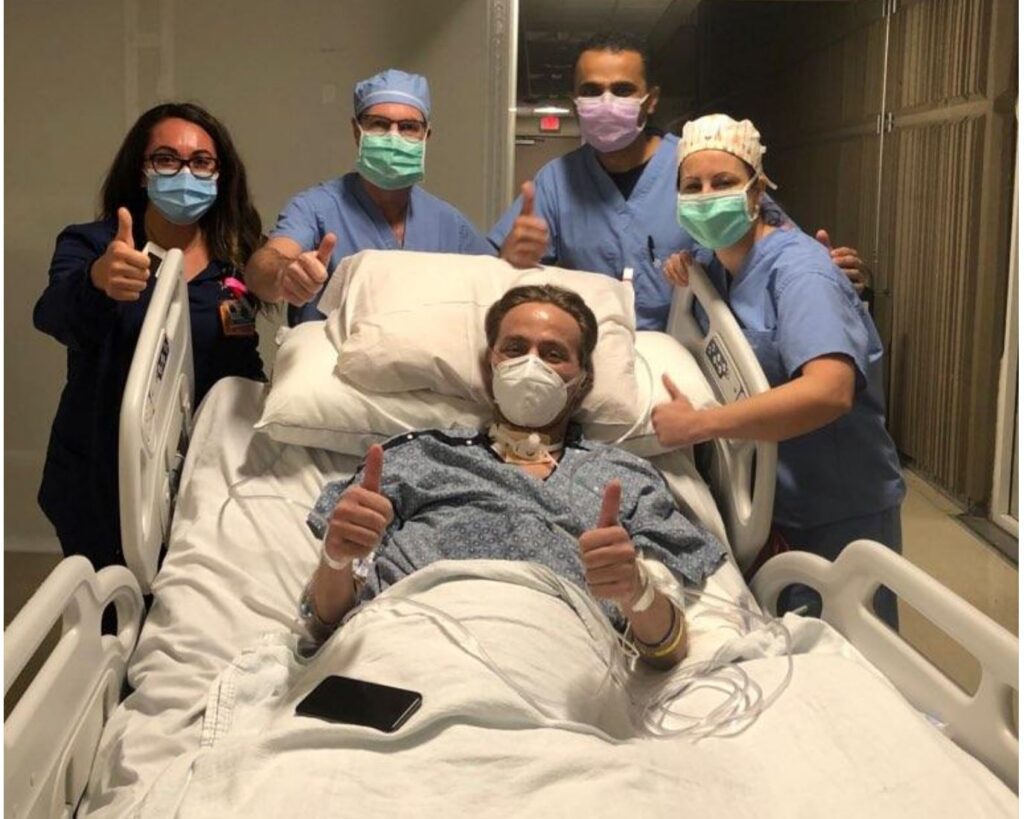
Dr. Chirag Patel, a thoracic surgeon at Chandler Regional and St. Joseph’s Norton Thoracic Institute, has a message for those who aren’t taking the COVID-19 pandemic seriously: Please do—your life may depend on it.
Patel was part of an ICU team that took care of Ryan Parker, a 39-year-old Chandler man who spent a whopping 134 days in the hospital due to COVID-19. The athletic father of two young boys had no underlying health issues but experienced severe complications from the virus.
“People get offended, but if you don’t practice social distancing, it could be your loved one that could wind up with severe COVID,” Patel said.
Last July, Parker came down with the virus. He never expected the ordeal that would follow and said his friends who got the virus all recovered quickly.
“What I had heard was, ‘Give it about seven days and the symptoms will go away.’ So that’s what I did. But on day six or seven, I started getting shortness of breath just walking to the kitchen.”
Parker called his primary-care doctor who sent him to the emergency room. When he showed up there, Parker’s oxygen saturation level, a measure of the amount of oxygen in the blood, was dangerously low at 63 percent.
“He was going hypoxic,” Patel said. “It’s life-threatening. We would expect anyone walking around to be above 92 percent.”
Parker was placed on oxygen and given steroids, plasma and Remdesivir, a drug that’s used to treat some hospitalized COVID-19 patients. For the first week, he was stable.
“Right around then is when he started breathing heavily and his respiration rate went up to 30 and 40. A normal rate for adults is 12-20 breaths per minute. His oxygen level started dropping more and “at this point we had already maximized him on the amount of oxygen through his nose and the only option at that time was to put him on a ventilator,” Patel said.
Parker’s condition continued to deteriorate.
“And that’s when I called my ICU team down at St. Joe’s,” Patel said. “We decided he would be a candidate for ECMO.”
Parker was transferred by ambulance to Dignity Health’s St. Joseph’s Hospital and Medical Center in downtown Phoenix and placed on Extracorporeal Membrane Oxygenation, or ECMO. The machine, which is also used for patients undergoing heart-lung transplants, works by taking blood from the body, loading it with oxygen and removing carbon dioxide. For COVID-19 patients, it means their lungs get to rest and recover.
Parker was on ECMO for nearly three months.
“For about two and half months, Ryan was completely sedated. He was paralyzed essentially in what’s called a medically induced coma,” Patel said. “Probably for about a month or so, we were able to keep him awake while he was on ECMO. We got him to a point where he was not on the ventilator and he was maintained on ECMO.”
At that juncture, Parker was able to take a stroll through the healing garden outside the hospital, even though the ECMO was still doing the work for his lungs.
Not every hospitalized COVID-19 patient is placed on ECMO however.
“It’s not like a miracle cure that’s going to cure every COVID patient because it is very complex,” said Sara Patterson, manager of external communications for Dignity Health’s Arizona Division. “It’s individualized. Every patient is evaluated based on their situation.”
After four months, Parker was released from the hospital just in time to be home with his family for Thanksgiving.
“The family prayer at Thanksgiving—everybody gave thanks for me and for everyone who took care of me. It was pretty emotional.”
His two sons, ages 7 and 10, were only able to see him twice while he was hospitalized and were especially thankful to have their father home. These days, Parker is able to drive and move around without the use of a walker and said he’s planning to return to work as a medical device salesman next month.
The nightmare he’s been through has understandably given rise to a new perspective.
“It’s given me a new appreciation for just all the little things,” Parker said. “I cherish my time with my family so much. I always did, but just to lay on the couch and hang out with my kids, it’s priceless.”
His family is also grateful for Parker’s long-fought-for recovery.
“It was pretty scary there for a while,” Parker said. “Honestly, I think they started thinking I wasn’t going to make it. So they are very, very thankful.”
For those who believe that the pandemic isn’t real, Parker offers this insight:
“Even when I was sick, I never expected this to happen,” he said. “I would say, please use extreme caution. I would have given anything to be in isolation with my family at home instead of in an ICU fighting for my life.”

